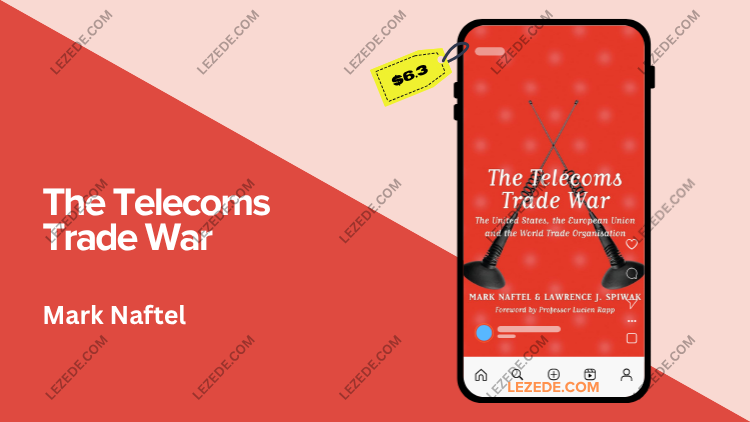The Telecoms Trade War by Mark Naftel Free Download – Includes Verified Content:
Review of The Telecoms Trade War by Mark Naftel
The telecommunications industry has long been a fast-evolving sector, shaped by rapid technological progress and shifting regulatory policies. In their influential book, The Telecoms Trade War, authors Mark Naftel and Lawrence J. Spiwek explore the complex interplay between the U.S. and European telecom markets. This investigation is especially relevant in the aftermath of the 1997 World Trade Organization (WTO) agreement on basic telecommunications services, which was expected to usher in a new era of competitive growth and innovation. Instead, the authors contend that deregulation has sparked a complicated trade dispute, creating significant regulatory hurdles and intensifying competitive tensions on both continents.
Naftel and Spiwek critically challenge common narratives that oversimplify the effects of telecom liberalization. Through thorough analysis supported by multiple case studies, they reveal the detrimental consequences of prioritizing protectionist regulatory policies over genuine market competition. Their perspective highlights a growing regulatory cynicism, demonstrating how policymakers on both sides of the Atlantic have largely failed to nurture an environment conducive to sustainable competition, which in turn adversely affects consumer outcomes.
Understanding the Dynamics of the Telecoms Trade War
The telecom trade conflict outlined by Naftel and Spiwek centers around the differing regulatory approaches adopted by the U.S. and Europe. The authors carefully detail how deregulation—initially hailed as the solution to industry stagnation—has instead escalated tensions. Early hopes predicted that deregulating would fuel innovation and reduce consumer costs. However, the reality has frequently been the opposite, with regulations acting more as obstacles than enablers.
A major argument in the book is how both regions struggled to balance the promotion of competition with the protection of domestic telecom interests. This tension resulted in trade barriers that limited new entrants and distorted fair competition for existing firms. For example, protective policies favoring national champions provoked retaliatory measures, deepening conflicts and complicating regulatory frameworks. Thus, the telecoms trade war is a complex struggle driven by national interests and global economic forces.
Through detailed case studies, the authors illustrate the consequences of outdated regulatory models. They argue that protecting incumbent players at the expense of open competition undermines the market’s potential, urging a fundamental shift toward regulatory frameworks that genuinely promote competition and consumer benefits. This call to rethink entrenched “business as usual” mindsets runs throughout their analysis.
Case Studies and Regulatory Cynicism
One of the most compelling aspects of The Telecoms Trade War is its use of real-world case studies to anchor theoretical points. Naftel and Spiwek examine specific regulatory decisions that shaped market outcomes, often leading to unintended trade conflicts. These examples clearly show how protectionist policies can damage market efficiency.
A comparative look at U.S. and European regulatory styles reveals distinct approaches to market access and fairness. European regulators tend to enforce stringent rules aimed at protecting consumers but risk stifling innovation by reinforcing incumbent dominance. Conversely, the U.S. market emphasizes deregulation, resulting in more new competitors but also concerns over monopolistic tendencies among leading telecom companies.
These case studies reinforce the authors’ concept of regulatory cynicism—where policymakers favor preserving existing market structures over fostering true competition. Such an approach risks stagnation, hindering progress and innovation that ultimately harms consumers through higher prices and fewer choices. The book makes a strong case for urgent regulatory reforms as both regions confront these challenges.
The Role of Consumer Welfare in Telecom Regulations
A central theme in The Telecoms Trade War is the prioritization of consumer welfare in shaping telecom policies. Naftel and Spiwek argue convincingly that regulatory frameworks must focus on enhancing consumer benefits to create lasting competition. However, they observe that current policies in both the U.S. and Europe often fall short, favoring bureaucratic or protectionist interests instead.
The authors call for a paradigm shift from defensive regulation to proactive competition encouragement. By lowering barriers for new entrants, regulators can stimulate competition, reduce prices, and improve service quality. This approach would also incentivize established firms to innovate to maintain their market positions.
Moreover, the book maps out how various regulatory approaches impact outcomes, urging a more consumer-focused policy design. Understanding the motivations and effects behind regulatory decisions is key to fostering an innovative and competitive telecom environment. Thus, the work not only critiques current practices but also offers a clear pathway toward reform centered on consumer interests.
Insights into the Future of Telecommunications Policy
The concluding sections of The Telecoms Trade War look ahead to future telecom policy developments. Naftel and Spiwek stress that as technologies like 5G and the Internet of Things (IoT) advance, adaptable and forward-looking regulatory frameworks become critical. They warn that outdated regulations could impede innovation in vital areas such as smart cities and the expanding digital economy.
The authors propose innovative solutions to improve competition and align regulations with consumer welfare goals. These include encouraging infrastructure sharing among operators to lower entry costs and foster competitive markets. They also advocate for increased international regulatory cooperation to ease trade frictions, enabling more consistent and predictable rules that benefit operators and consumers alike.
In sum, the authors emphasize that proactive regulatory reform is essential to navigate the rapidly evolving telecom landscape. Their work is both a challenge to policymakers and an important contribution to ongoing debates about the future of telecom regulation.
Conclusion
The Telecoms Trade War by Mark Naftel and Lawrence J. Spiwek offers a critical and comprehensive examination of the regulatory dynamics influencing the U.S. and European telecommunications sectors. Through insightful analysis and illustrative case studies, the book critiques the widespread reliance on protectionist measures and highlights their negative impact on competition and consumer welfare. The authors make a compelling argument for fostering innovation and competition, which ultimately benefits consumers.
Looking forward, the insights provided challenge regulators and industry stakeholders to rethink their approaches and ensure that fast-paced technological advancements are matched by equally progressive regulatory frameworks. This book is an essential read for anyone interested in the complex interplay between telecom policy, trade, and market competition.










